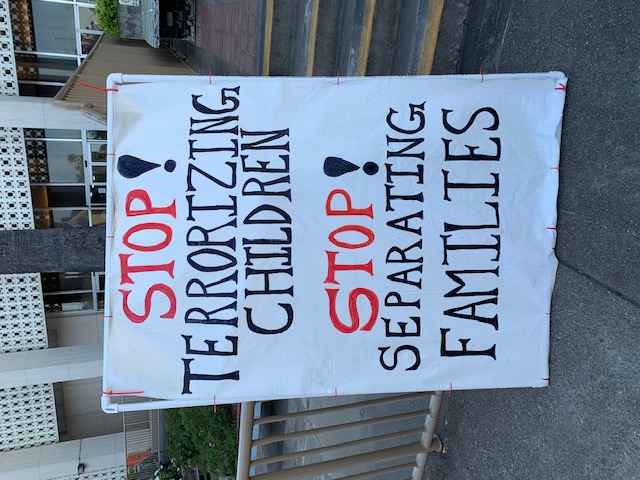Three Bay Area parents currently seeking asylum in the United States sued the US government this week after being separated from their children by federal agents in 2018, alleging that the policy violates Customs and Border Protection regulations.
The plaintiffs, referred to simply by the monikers Wilbur, Erendira, and Joshua due to their immigration status, also allege that poor treatment that they experienced while in federal custody, including being forced to sleep on the floor, given non-potable drinking water, and receiving no first aid after entering custody, violates the Eighth amendment of the Constitution.

The complaint marks the first time that plaintiffs in Northern California have sued the federal government through the Federal Tort Claims Act, alleging that the Trump administration’s policy of separating families at the border violated the Constitution as well as CBP regulations. The FTCA allows people to sue the federal government for harm done to them by federal agents, and demand compensation.
Poor conditions endured by asylum-seekers in Customs and Border Protection custody were outlined in the complaint with testimony from plaintiffs such as Wilbur, who traveled from El Salvador along his 11-year-old son in 2018, named Wilfredo in the complaint. Upon being found by Customs and Border Protection agents near the U.S.-Mexico border, they were placed into a CBP vehicle for transfer to a detention facility and were not offered food, water, or medical care upon being found; both were exhausted after their journey and Wilbur’s feet were badly infected after many days of travel on-foot, the complaint states.
Once they were placed at a detention center, Wilbur was told that in order to receive medical care he and his son would have to stay in detention longer, and upon separation, Wilbur was told by both Customs and Border Protection agents as well as Immigration and Customs Enforcement agents that he would only receive information about Wilfredo or be reunited with him if he agreed to be deported back to El Salvador, which terrified Wilbur, having fled the country out of fear of being killed.
Plaintiffs allege that the family separation policy is unconstitutional because the parent-child relationship and the importance of children being with their parents have been deemed constitutionally protected by past precedents.
“The Supreme Court has consistently recognized that the parent-child relationship is constitutionally protected and that it is constitutionally important for children to remain with their parents. These constitutional protections extend to citizens and non-citizens alike, even when confined by the government,” the complaint states.
Plaintiffs also allege that the family separation policy violates the CBP’s National Standards on Transport, Escort, Detention, and Search where it states “CBP will maintain family unity to the greatest extent operationally feasible, absent a legal requirement or an articulate safety or security concern that requires separation.”
With regard to inhumane conditions and treatment while in custody, plaintiffs claimed that being forced to sleep on the floor, being held in brightly-lit rooms even at night, and given inedible food and water were unconstitutional under the Eighth amendment, pointing to the Farmer v Brennan and Thomas v Baca decisions, which ruled in 1994 and 2007 that subjecting people in federal custody to poor conditions, including forcing them to sleep on the floor, constitute cruel and unusual punishment.
“The Constitution mandates that the government meet the basic human needs for sleep, food, water, sanitation, medical care, and reasonable safety of anyone in custody,” the complaint states.
Christopher Sun, an attorney at the law firm Keker, Van Ness, and Peters LLP , which is representing the plaintiffs, said that it is both the act of family separation as well as the poor conditions endured by the asylum seekers that make the actions of the federal agents particularly cruel.
“It goes so far beyond just the act of the separation…the government pursued an intentionally harmful program, threw them in cells that were dirty, refused to provide them adequate food, clothes, medical attention,” Sun said.
Hayden Rodarte, an attorney and a Justice Catalyst Fellow at the Lawyers’ Committee for Civil Rights of the San Francisco Bay Area, which is partnering with Keker, Van Ness, and Peters LLP in representing the plaintiffs, noted that the lawsuit is intended not only to secure damages for the plaintiffs, but also to put momentum behind immigration reform for asylum seekers.
“Although this lawsuit is about seeking monetary compensation, there is a larger goal for a pathway to permanent protection for asylum seekers…we need to end immigration detention as we know it. We know from the experience of these families that it is inhumane and deprives them of their human rights,” Rodarte said.
Following the filing of the lawsuit, the federal government has 30 days to respond, either with a motion to dismiss the complaint, or file an answer, where they admit or deny each allegation made in the complaint, after which further legal proceedings would follow.





